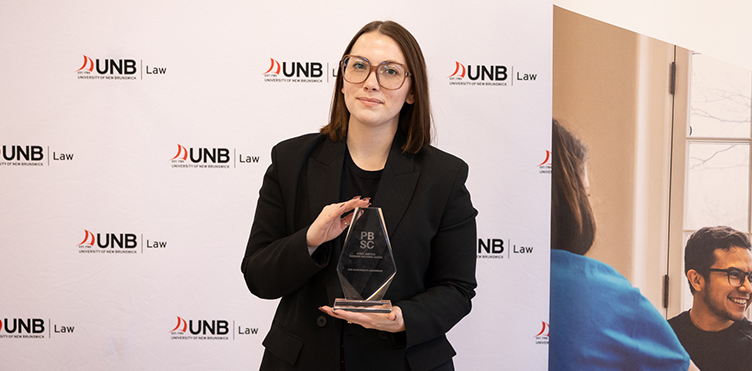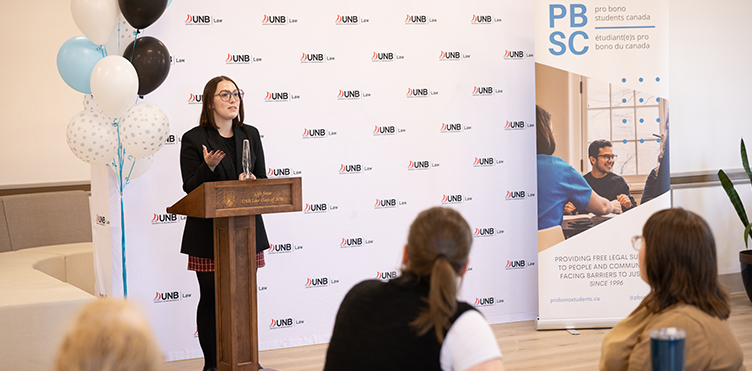
Ceilidh Feetham has long been driven by a commitment to advancing the rights and well-being of women. When she arrived at UNB Law, joining Pro Bono Students Canada (PBSC) felt like a natural extension of that passion. Focused on improving access to justice, Ceilidh has played a key role in developing legal resources for women facing sexual violence and barriers to reproductive healthcare.
This spring, Ceilidh’s dedication was recognized nationally when she was named the 2024–25 recipient of PBSC’s Chief Justice Richard Wagner Award for the UNB chapter. Established in 2019, this prestigious award program celebrates and recognizes PBSC’s outstanding student volunteers from across the country who have demonstrated exemplary leadership and commitment to PBSC’s mission of providing free legal support to people and communities facing barriers to justice.
Ceilidh first discovered her love for the law and pro bono work through Toronto Metropolitan University’s (TMU) Law and Business program, where she held a position with the pro bono business law clinic in her final year of study.
“It was my first time working with clients in a legal capacity,” Ceilidh observes. “That’s when I realized how meaningful pro bono work can be. It’s not necessarily charity—there are so many ways it can make a real impact, even in the business context.”
Ceilidh was accepted to law schools across Ontario and Eastern Canada. She chose UNB for a few very specific reasons…and the hype was real.
“What I heard about UNB Law is how much grit the students have—how community-oriented they are,” she says. “You get more face time with faculty, and more hands-on opportunities because the student body is smaller.”
Ceilidh’s first PBSC project in 1L was a research initiative with the Abortion Rights Coalition of Canada, which culminated in a paper titled Restricting Anti-Abortion Speech – Legal Strategies and Caselaw. The paper serves as a case study examining how municipalities can potentially block anti-abortion messaging and advertising from public infrastructure without triggering a Charter challenge.
“I was coming to UNB Law from Toronto, where I knew there had been a recent spike in incidents of violence against women on public transit, so I wanted to look at how perpetuating messages that tend to be against women’s rights to choose, impact public safety in an environment where they might already face a particular risk to their physical and mental safety.”
Her paper focuses primarily on administrative and constitutional law, examining the recent decisions involvingmunicipalities across Canada in addressing the issue of anti-abortion advertising.
“I learned that anytime a decision of this nature is made, there’s a risk of infringing on freedom of expression or freedom of religion rights. It was interesting to see how municipal decision-makers are expected to balance those rights against important public policy objectives. It was a challenging but incredibly rewarding paper to write.”
In Ceilidh’s second year with PBSC, she worked on Sexual Violence New Brunswick’s (SVNB) public legal education project with 2L classmate Naomi Pinno. SVNB offers resources to individuals who have experienced sexual assault and/or sexual violence. The organization works to lead systemic and social change to further its mission of having communities free of sexual violence.
The branch that Ceilidh and Naomi were working at had recently started its own independent legal advice clinic with lawyers representing clients pursuing legal action in response to incidents of sexual violence. The pair contributed to a survivor resource project, aimed at improving access to legal information for survivors of sexual violence.
“Our goal this year was to draft resources that allowed claimants to maximize their limited time with a lawyer—to ensure that their time together is spent on the more complex aspects of the case rather than going over the ancillary information that can be learned through accessible resources.”
The pair created four different resources for SVNB, including an informational leaflet outlining how police collect, use, and store data from a claimant’s cell phone, and the claimant’s rights and obligations; an FAQ brochure explaining evidence and records disclosure provisions under the Criminal Code in the context of criminal trials; a resource compiling information on why the Crown may choose against pursuing criminal charges in cases of sexual violence, including alternative legal action available to claimants; and finally, a self-assessment tool for individuals who think they may be experiencing sexual harassment in the workplace, which allows individuals to collect their thoughts and reflect on what they have been experiencing through a checklist. This final tool also breaks down whether there are any essential steps for individuals to consider before speaking to a lawyer.
“Our work supported both survivors and legal professionals by developing materials that clarified key aspects of the legal process. This work contributes to broader efforts to improve legal accessibility and survivor support within the justice system.”

Although Ceilidh already appreciated the value of pro bono work before law school, she found that engaging in it as a law student offered a distinct and eye-opening perspective.
“When you’re going through the standard law school curriculum, it can feel very theory-oriented—you’re reading caselaw and learning complex concepts and sometimes writing your 100% final. It’s easy to feel disconnected from the way the law works in practice and the bigger picture, so to speak.”
Participating in PBSC was a reminder of why she wanted to pursue law. It marked a shift—from learning in the abstract to applying that knowledge in meaningful ways.
“It’s a rewarding shift—getting the opportunity to actually apply the knowledge you build. You come to fully appreciate that there are real people who need access to this information, and many of them can’t possibly be expected to make sense of a dense case or a lengthy statute.”
When asked if she would ever consider incorporating pro bono work into her future career as a lawyer, Ceilidh explained that inquiring about pro bono work is consistently on her list of questions to ask during job interviews.
“By studying the law, you’re part of a pretty narrow portion of the population that can grasp an integral function of society. I’ve always felt that I should use that knowledge to benefit others, so for me, anywhere I go, it’s integral that some element of pro bono work is part of what I do.”
Ceilidh wants to encourage students, especially new students, to find ways to get involved at UNB Law.
“The amazing thing about PBSC is that you don’t need to be a lawyer or a legal professional to be able to make a meaningful contribution. Law school can be overwhelming, and it’s easy to get caught up in all the reading and studying. But through opportunities like this, you not only learn so much, you also build relationships and gain perspectives that you wouldn’t get from the classroom alone. It’s important to take those chances to learn in different ways and connect with different people, because they’re incredibly valuable to everyone involved.”